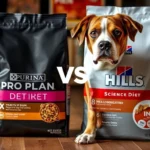
Introduction
Dog nutrition plays a critical role in the overall health and well-being of our furry companions. Just like humans, dogs require a balanced diet to thrive, and the food we provide them should meet their unique nutritional needs. However, the safety of dog food is paramount, and unfortunately, recalls can occur, posing risks to our pets’ health. Understanding what to do when your dog food has been recalled is essential for any responsible dog owner.
In this article, we will explore dog food recalls, their implications for pet health, and provide a comprehensive guide on how to handle such situations. Our goal is to equip you with the knowledge and resources needed to ensure your dog’s safety and nutrition.
Understanding Dog Food Recalls
What is a Dog Food Recall?
A dog food recall is an action taken by a manufacturer to remove a product from the market due to safety concerns. Recalls are often prompted by contamination, nutritional deficiencies, or other issues that could harm pets. The purpose of a recall is to protect dog owners and their pets from potential health risks associated with consuming unsafe products.
How Recalls are Announced
Recalls can be announced by various organizations, primarily the Food and Drug Administration (FDA) and the Association of American Feed Control Officials (AAFCO). These organizations monitor pet food safety and work to inform the public when a product is deemed unsafe. Recalls are typically communicated through official channels such as websites, social media, and press releases, making it essential for dog owners to stay updated.
Impact of Recalls on Dog Health
When a dog consumes recalled food, there can be severe health risks. Contaminated food may lead to foodborne illnesses, while nutritional deficiencies can cause long-term health issues. Symptoms to watch for include vomiting, diarrhea, lethargy, and loss of appetite. Being aware of these symptoms can help dog owners act swiftly and protect their pets’ health.
Identifying a Dog Food Recall
Checking for Recalls
To ensure your dog’s safety, it is vital to regularly check for recalls. Official websites of the FDA and AAFCO provide updated information on recalled products. Additionally, reputable news outlets often cover significant recalls. Staying informed through trusted sources can help you quickly identify if your dog’s food is affected.
Recognizing Recalled Products
Understanding product labels is crucial for identifying recalled dog food. Look for batch numbers, expiration dates, and specific brand names. Many recalls will specify which products are affected, so familiarity with your dog’s food packaging will make this process easier.
Resources for Recall Information
Several resources can help you monitor dog food recalls effectively. Some reputable websites include the FDA’s Pet Food Recalls page and various pet health organizations. Additionally, consider signing up for alerts from dog food manufacturers or watchdog organizations to receive real-time updates on recalls.
Immediate Steps to Take if Your Dog Food is Recalled
Stop Feeding the Recalled Food
The first and most critical step is to discontinue feeding the recalled food immediately. Avoid giving your dog any remaining product, as it could pose health risks. For safe disposal, consider sealing the food in a container to prevent other animals from accessing it.
Check Your Dog’s Health
Assessing your dog’s health is vital after discovering a recall. Monitor for potential health issues, such as vomiting, diarrhea, or lethargy. If you notice any concerning symptoms, it is important to consult your veterinarian right away. Early intervention can be crucial in preventing serious health complications.
Reporting Health Concerns
If your dog experiences adverse health effects from consuming recalled food, it is essential to report these concerns. Contact the manufacturer to inform them of your dog’s symptoms and document any health issues experienced. Additionally, report your dog’s condition to the appropriate regulatory bodies, such as the FDA, to help ensure that other pet owners are informed.
Alternatives to Recalled Dog Food
Choosing a Temporary Diet
While dealing with a recall, you may need to provide your dog with a temporary diet. Homemade balanced meals can be a safe option. Simple recipes might include boiled rice, chicken, and vegetables. It’s essential to ensure that any temporary diet meets your dog’s nutritional needs. Alternatively, consider over-the-counter dog food options that are known to be safe.
Selecting Safe Brands
When choosing alternatives to recalled dog food, prioritize brands with a good safety record. Look for products that have been verified by AAFCO and undergo third-party testing. Researching dog food brands can help you find options that prioritize safety and quality.
Transitioning Back to Regular Food
Once the recall issue is resolved, and you have selected a safe replacement, transitioning back to your dog’s regular food should be done gradually. Start by mixing a small amount of the regular food with the new food and gradually increase the proportion of regular food over several days. This approach can help prevent digestive upset and ensure a smooth transition for your pet.
Preventing Future Issues
Regularly Monitoring Dog Food Recalls
Developing a habit of checking for dog food recalls regularly is a proactive approach to pet health. Make it a routine to visit official websites or subscribe to newsletters that provide updates on recalls. Staying informed can help you protect your dog from potentially harmful products.
Educating Yourself on Dog Nutrition
Understanding your dog’s nutritional needs is crucial for their long-term health. Invest time in educating yourself about dog nutrition through books, online courses, and reputable blogs. Knowledge about the essential nutrients your dog requires will empower you to make informed decisions about their diet.
Building a Relationship with Your Veterinarian
Establishing a good relationship with your veterinarian is vital for monitoring your dog’s health. Regular check-ups can help catch any potential health issues early on. Discussing diet and nutrition during these visits allows you to ensure that your dog is receiving optimal nutrition tailored to their individual needs.
Conclusion
Being proactive about dog food safety is essential for every dog owner. In the unfortunate event of a recall, knowing what to do when your dog food has been recalled can make all the difference in your pet’s health. By taking immediate action, monitoring your dog’s health, and educating yourself about nutrition, you can maintain a healthy diet for your beloved companion.
Final Thoughts
Maintaining awareness of dog food recalls and understanding the steps to take when they occur is crucial for ensuring the safety of our pets. By being informed and proactive, you can navigate any challenges that arise and provide your dog with the nutrition they need to thrive. Remember, a healthy dog is a happy dog!









